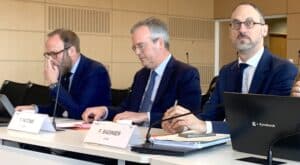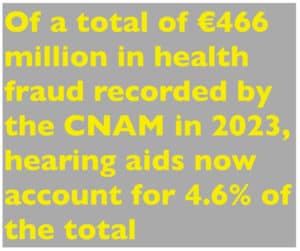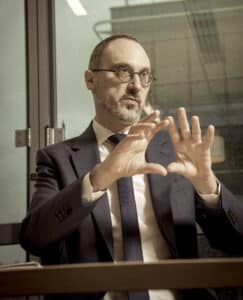France – the GREAT HEARING AID SWINDLE
It was a long time coming, but in 2019 new subsidies were finally introduced within the French public health system to cover a range of products and services that many other countries had for some time provided to their populations as essential to their well-being. Great enthusiasm welcomed the reform known as 100% Santé (100% Healthcare), which requires supplementary health insurance providers to cover 100% of the cost of approved glasses, dentures and hearing aids, with no out-of-pocket expenses.
But these blue skies soon clouded over. As editor-in-chief of Audio Infos France, Corinne Couté, has written, shadows formed between 2021 and 2023 when the increasingly competitive market was sullied by revelations of fraudulent abuse of the subsidies. These continuing swindles necessitate the intervention of the relevant authority, the National Fund for Health Insurance (Caisse nationale de l’assurance maladie – CNAM), and have led to continuing multiple criminal cases.
The problem meant the CNAM filing more than 300 criminal complaints in 2023 relating to hearing aid fraud, making the sector one of the health professions most affected by abuses. Thomas Fatôme, Director of the CNAM, sees the problem worsening in 2024. It has risen to become one of the institution’s three main priorities – alongside health centre and sick leave fraud – and the 2023 cases identified and acted upon by the CNAM accounted for €21.3 million in fraud, putting it in 6th place among problem sectors over the year.

CC
CNAM press conference on the fight against fraud, March 28, 2024, at the Health Insurance headquarters, Paris. From left to right: Marc Scholler, director of audit, finance and the fight against fraud of Health Insurance, Thomas Fatôme, Director, and Fabien Badinier, Deputy Director of Fraud Control.
With a total of €466 million in health fraud recorded by the CNAM in 2023, hearing aids now account for 4.6% of the total, but they are responsible for the biggest increase, rising from a figure close to zero in 2022. The 2023 fraud league was topped, incidentally, by pharmacists, many of whom proved especially dishonest in connection with Covid testing.
But who, in the hearing sphere, are the perpetrators? Journalist Corinne Couté explained that we are not talking about the criminal underworld taking advantage of a booming sector and exploiting loopholes, but “people in the sector, opticians and hearing aid audiologists, beginners, experienced, or would-be professionals, who have allowed themselves to be led astray, sometimes seriously, in a manner worthy of big-time crooks.”
“With an average of 750 centres being set up each year since 2022, experts even suggest that the newcomers were simply disappointed with the results and that some could not resist the temptation of easy money,” comments Couté in a recent leader article on these frauds.
How are hearing aids reimbursed in France?
The 100% Santé system obliges the hearing care professional to make patients at least one 100% Santé offer for each ear to be fitted. These can qualify for a 100% reimbursement.
As explained by the official state info site, Service-Public.fr, the audiologist provides the patient with a quotation that must show the total price, including all accessories, of the proposed hearing device and fitting services; as well as other details including brand, warranty period, and the payment arrangements through health insurance.
The HCP sends the estimate to the patient’s local French National Insurance Fund (Caisse Primaire d’Assurance Maladie – CPAM).

Hearing aids are covered on medical prescription provided they are on the refundable list of products and services. Devices are class one or class two.
Class 1 hearing aids : these hearing solutions meet the essential needs of hearing, with a guarantee of quality. They come in the 100% Santé basket, so they are free.
Class 2 hearing aids — Higher-end custom solutions. These meet all specific needs with more advanced technologies, to treat complex hearing loss. Costs may not be reimbursed by the public health insurance, but the patient’s mutual health insurance or supplementary health insurance provider may cover all or part.
“To qualify for reimbursement, hearing aids must be prescribed by a doctor – an ear, nose and throat specialist (ENT) or an equipped general practitioner – who, after carrying out an audiogram, will write a prescription for a hearing aid if he or she deems it necessary”, reminds the Assurance Maladie, which also advises choosing a hearing aid specialist close to home to facilitate the fitting phase, which often requires several appointments.
What types of hearing aid fraud are the most frequent?
The sordid details of these diddles was revealed by Audio Infos France in an interview with Fabien Badinier, Deputy Director of Fraud Control at the CNAM:
• People who fit hearing aids at home, for example, or connivance between optical and hearing aid shops;
• Prosthesis – when hearing aids are billed to the CNAM when it is actually optical equipment that is being supplied, such as branded sunglasses;
• False diplomas, unauthorised itinerant activities, the absence of a hearing aid audiologist in the practice, and other frauds in the hearing profession overall;
• Fraud involving prescription procedures, the absence of prescriptions or forged prescriptions. In some cases, doctors are involved. They validate tests that they have not carried out themselves;
• Fraud in billing to the CPAM.
Interestingly, teleaudiology consultations don’t meet the requirements, the CNAM arguing that you cannot analyse someone’s hearing during a teleconsultation when you don’t have them in front of you.

JIM WALLACE
Fabien Badinier, Deputy Director of Fraud Control at the CNAM (Caisse Nationale d’Assurance Maladie).
“It’s important to observe the eardrum and the ear,” stresses Badinier, pointing out the gravity of the subject. “At the end of the day, if people are offered hearing aids when they don’t need them, or if the hearing aid is poorly fitted – we’ve seen this happen in TV reports and in our complaints – then the hearing aids stay in the box. This can mean a loss of opportunity for the person concerned. It’s not just a question of damage to the Assurance Maladie, it also concerns patients,” he underlines.
With more and more centres performing both optical and audiological tasks, some have taken advantage by committing invoicing fraud, the equipment invoiced not always being that which is delivered, the fraud often being worked in collusion with an optician, Badinier points out. “Customers are told, ‘Don’t worry; you want a pair of sunglasses to prescription? We’ll take care of everything’, and it’s hearing aids that are billed to the Assurance Maladie. Sometimes, equipment is billed without ever being handed over, whether it’s a pair of glasses, hearing aids or anything else. I would like to reassure them that this is not unique to hearing aid practitioners; in all professions we have what are known as fictitious acts, and it happens with hearing aid practitioners too.”
In one outstanding case, this fraud-fighting expert outlines, “The same owner had two centres and wanted to send all the funds abroad. We managed to stop him. We ourselves took the case to the commercial court to have the centres wound up by court order, and had the police block the transfer of funds, which is a rare move for the Assurance Maladie.”
In 2023, investigators set up a system of calls to some of the 767,000 policyholders who had benefited from a fitting to check that procedures were correct and analyse the conditions under which claims was made. Some 16,000 targeted invoices were also analysed, 9,000 of which were rejected, 33% because there had been no actual consultation with a doctor – in particular because of teleconsultations in hearing centres – 20% because the device had not actually been supplied, and 15% because the medical prescription was false.
Statisticians catch out fraudulent centres
The CNAM remains alert to all types of fraud, and checks billings of healthcare professionals to look for those that seem atypical compared with the rest of the profession. They do this for all sectors.
“We know that billing the Assurance Maladie is not always straightforward, and there can be errors, but this does not mean that there is fraud. In such cases, we go back to the professional, check with them how they should be billing and everything returns to normal.
On the other hand, those we have in our sights have been targeted through analysis of our reimbursement databases, which reveal some very surprising elements. We have statisticians who are experts in this field. For example, when a centre fits five or six times more patients under the age of 30 or 40 than the national average, we have to wonder,” says Badinier.
When the basic conditions for practising as a hearing aid practitioner are not met (lack of premises, false qualifications, etc.), the CNAM now also directly removes hearing aid companies from its files “to put an immediate stop to fraudulent activities”, explains Thomas Fatôme, who revealed that more than ten hearing aid companies have already been affected by this ban since the beginning of 2024.
How are hearing aid fraud cases reported?
Many fraud cases reach the CNAM through individuals reporting anomalies. Policyholders go to their local CPAMs or write to them by post or email saying they haven’t understood their reimbursements. “Sometimes people tell us, ‘But I’ve never had anything!’” reveals Fabien Badinier.
“We also get reports from the trade unions, which are very involved in the fight against fraud, whether it’s the Syndicat National des Entreprises de l’Audition (Synea) or the Syndicat des audioprothésistes (SDA). For them, it is important that there are no fraudsters in the profession,” continues Badinier.
But, importantly, this chief hustle-hunter is at pains to point out that fraudsters represent “only a small proportion of the population”.
“Fortunately for us, the vast majority of healthcare professionals do not commit fraud. It’s important to say this, because my role is to fight against the actions of fraudsters, not against a profession. We announced last October that we had launched inspection operations on 130 hearing centres, and since then we have added around 30 to the list. This represents 160 hearing centres under surveillance out of the more than 7,000 in France today; it remains limited,” concluded Badinier.
Source: Audiology Worldnews EUHA Conference Special October 2024